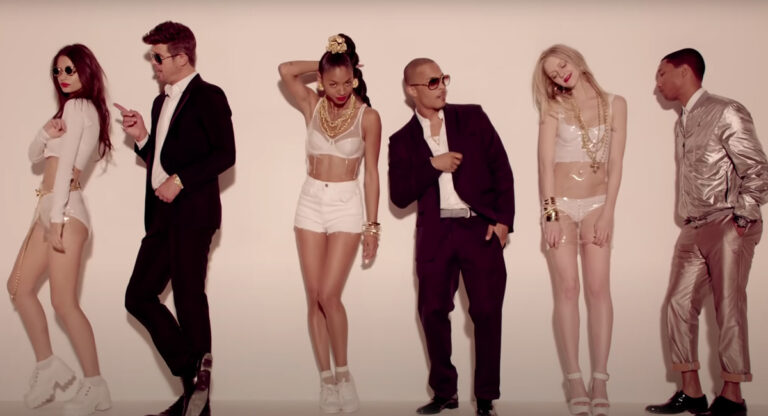Emily Ratajkowski accuses Robin Thicke of groping her on ‘Blurred Lines’ set
‘Blurred Lines’ has been a controversially debated and justifiably critiqued song. It’s dangerous messaging around consent—or lack thereof—is no longer isolated to the lyrics as new allegations surface. Emily Ratajkowski has come forward to accuse Robin Thicke, one of the song’s lyricists, of groping her on the set of the music video. Model Ratajkowski, who for many got her ‘big break’ via the song’s popularity, has shown through her allegations that many women often suffer silently in the pursuit of their careers.
Ratajkowski has accused singer-songwriter Thicke of grabbing her bare breasts on the set of the music video for the 2013 song ‘Blurred Lines’. She was one of three models to star in the video alongside the writers and creators of the song: Thicke, singer and producer Pharrell Williams and rapper T.I. The Sunday Times reports that this accusation appears in the model’s soon-to-be published book My Body.
In it she writes, “Suddenly, out of nowhere, I felt the coolness and foreignness of a stranger’s hand cupping my bare breasts from behind… I instinctively moved away, looking back at Robin Thicke. He smiled a goofy grin and stumbled backward, his eyes concealed behind his sunglasses. My head turned to the darkness beyond the set.”
The model, who would have been around 22 years of age at the time, suggested that at first she felt comfortable and enjoyed the process of filming—the video was shot by an all-female team—however, Thicke’s behaviour caused her to feel “naked for the first time that day.” “Desperate to minimise” the situation, Ratajkowski did what many would in such a situation, “I didn’t react—not really, not like I should have.”
“I pushed my chin forward and shrugged, avoiding eye contact, feeling the heat of humiliation pump through my body.” She cites how, despite the all-female crew, it was a cruel reminder of the real power dynamics at play, “With that one gesture, Robin Thicke reminded everyone on set that we women weren’t actually in charge… I didn’t have any real power as the naked girl dancing around in his music video. I was nothing more than the hired mannequin.”
Ratajkowski details above how Thicke’s actions disrupted the imagery the director of the video was trying to create; Diane Martel’s intent behind the video was to actually subvert the power dynamics between men and women, presenting the men (Thicke, Williams and TI) as inferior while the models mocked them. Martel told The Times that she witnessed Thicke’s behaviour and “screamed” at him.
“I remember the moment that he grabbed her breasts. He was standing behind her as they were both in profile,” she stated. Both women claim the singer was drunk during the incident. Martel continued saying that the musician “sheepishly apologised” for his behaviour at the time.
Despite the outrage behind the song’s lyrics, the tamest being ‘I know you want it’, and its subsequent ban from several universities did horrifyingly little to slow its growth—topping charts worldwide and becoming the UK’s most-downloaded song ever in 2014. Thicke has continuously defended the song since its release, telling the BBC in 2013 that the critics just didn’t “get” it. Williams, the song’s co-creator, also initially defended the song, however, later admitted to GQ in 2019 that upon further reflection he felt “embarrassed” by the lyrics, realising that “there are men who use the same language when taking advantage of a woman.”
Thicke has yet to respond to the reports regarding the incident.





